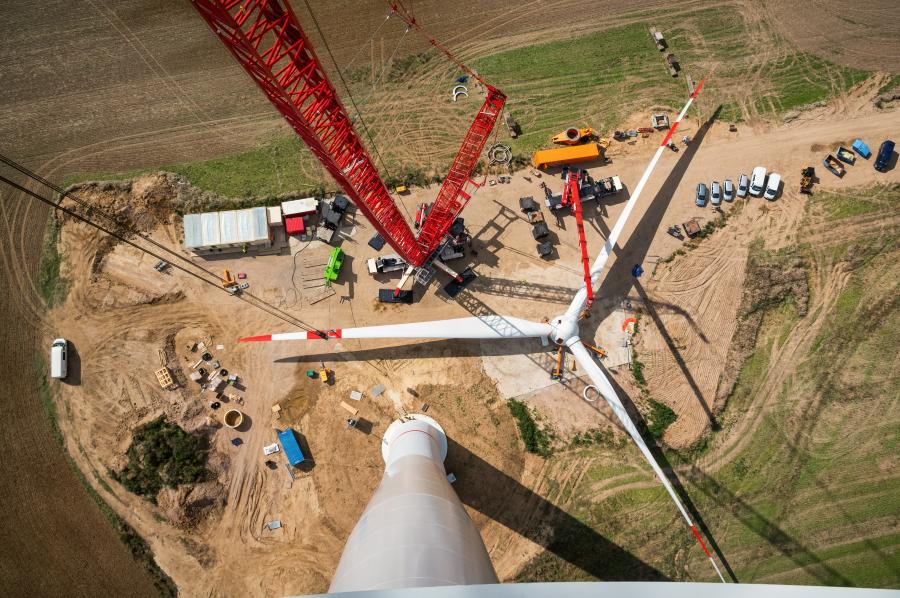Federal agencies will prioritize the purchase of steel, concrete, asphalt and flat glass that feature lower emission levels in their manufacturing, transportation, installation, maintenance and disposal.
Instructions for integrating President Joe Biden's Buy Clean Initiative are on the way, compliments of an interagency task force overseeing the procurement program. Agencies will receive the instructions, which prioritize the purchase of steel, concrete, asphalt and flat glass that feature lower emission levels in their manufacturing, transportation, installation, maintenance and disposal.
These materials account for 98 percent of the government's purchased construction material, according to the task force.
"In addition to federal procurement, Buy Clean will cover federally-funded projects," said the task force.
The group pointed out that last year's infrastructure spending law included funds for GSA, Transportation and EPA to "designate and use construction materials and products that produce substantially lower levels of greenhouse gas emissions."
It also noted that the recently enacted Inflation Reduction Act provides funding for retrofitting industrial facilities and tax credits for clean technology manufacturing.
"The federal government is for the first time providing a market differentiation and incentives for lower-carbon materials," said the task force. "Companies across the nation will be rewarded for cutting carbon pollution across their entire value chains while supporting good American manufacturing jobs."
More than a dozen agencies that account for nine-tenths of federally-financed and purchased construction materials comprise the task force.
In the future, the group will continue to launch pilots, expand the scope of industrial pollutants and materials, engage industry and establish mechanisms for collection and public disclosure of the data.
From the Ground Up
In March, the General Services Administration (GSA) issued new standards for the concrete and asphalt used in nationwide GSA construction, modernization and paving projects.
These were the first standards in the United States to apply beyond a local jurisdiction.
So far, seven Bipartisan Infrastructure Law-funded paving projects have been completed using the new asphalt standards.
All of these projects were awarded to and completed by small or disadvantaged businesses, said GSA.
"The historic passage of the Inflation Reduction Act provides a boost to these efforts with $3.375 billion that will allow GSA to invest in federal buildings with lower-carbon materials and sustainable technologies," said the agency.
It also will allow for the leveraging of emerging clean technologies that help achieve greater carbon reductions and catalyze American innovation.
"These investments help boost the competitiveness of American manufacturers developing sustainable materials and technologies," said GSA.
"Using domestic, lower-carbon construction materials is a triple win — creating good-paying American jobs, reducing energy costs and tackling climate change," said GSA Administrator Robin Carnahan. "At GSA, we've already started deploying standards that help reduce emissions and advance sustainable projects with little to no additional cost — while supporting small businesses along the way."
Under GSA's concrete and asphalt standards, construction contractors are required to provide a product-specific cradle-to-gate Type III environmental product declaration (EPD).
An EPD is a third-party-verified summary of the primary environmental impacts associated with a product's extraction, transportation and manufacture.
GSA's asphalt standard requires at least two environmentally-preferable techniques or practices to be used during the material's manufacture or installation.
These options include bio-based or alternative binders, recycled content and reduced mix temperatures. They are considered best practices that reduce fossil fuel use and environmental impacts.
Under GSA's low embodied carbon concrete standard, according to FedWeek.com, contractors are asked to provide concrete that reflects a 20 percent reduction in the amount of "embodied carbon," associated with its production.
GSA also will ask to hear directly from manufacturers, including small businesses, on the availability of construction material and products with lower embodied carbon.
Findings from that request for information will help the government understand industry trends and opportunities.
The investments are intended to reduce carbon emissions from the federal supply chain by millions of metric tons per year, save millions of dollars in energy costs and support GSA's sustainability goals.
Buy-Clean Commitments
The White House explained that the Buy Clean Initiative is a part of President Biden's economic plan to usher in a manufacturing boom in America.
The economic plan includes the Bipartisan Infrastructure Law, Inflation Reduction Act and CHIPS and Science Act.
"The initiative ensures that federal financing and purchasing power are creating good-paying jobs, protecting public health, enhancing American competitiveness and strengthening national security," said the White House. "Today's Federal Buy Clean actions build on Buy Clean commitments made earlier this year."
Those commitments include standing up the Federal Buy Clean Task Force, and complements Biden's comeback for American factories, which represents 668,000 added manufacturing jobs.
"The federal government is the largest direct purchaser in the world and a major infrastructure funder," said the White House. "By leveraging the U.S. government's purchasing power, President Biden is ensuring that American manufacturing is positioned to compete and lead, while catalyzing markets and accelerating innovation across the country."
The Inflation Reduction Act boosts the Federal Buy Clean Initiative with $4.5 billion in funding for GSA, DOT and EPA to use construction materials and products that substantially lower greenhouse gas (GHG) emissions.
The Inflation Reduction Act also provides the DOE with billions to invest in retrofitting industrial facilities and tax credits for clean technology manufacturing.
Through the Federal Buy Clean Initiative and Task Force, the federal government is for the first time providing a market differentiation and incentives for lower-carbon materials.
"Companies across the nation will be rewarded for cutting carbon pollution across their entire value chains while supporting good American manufacturing jobs," said the White House.
In addition to prioritizing the purchase of steel, concrete, asphalt and flat glass, the federal government will purchase these materials when they have fewer emissions.
The Biden Administration anticipates prioritizing additional construction materials and pollutants for Buy Clean Federal procurement.
The administration will expand lower-carbon construction materials used in federally-funded projects.
In addition to federal procurement, Buy Clean will also cover federally-funded projects.
The initiative will jumpstart a new partnership between state governments and federal partners to align state-based Buy Clean policies with federal incentives.
The incentives will expand markets for clean manufacturing and low carbon materials across the nation's buildings and infrastructure.
Next month, the White House will convene states to share knowledge and build capacity for public construction projects that support American workers and lower carbon emissions, it said.
The initiative will increase data transparency through supplier reporting to help American manufacturers track and reduce emissions.
The administration plans to expand the reliability, transparency and verification of EPDs including GHG emissions reporting for actual supply chain production.
The initiative will launch pilot programs to advance federal procurement of clean construction materials.
"Federal Buy Clean Initiative pilots have already broken ground across the country — from Denver, Colorado, to Salt Lake City, Utah, to Champlain, New York, to Lukeville, Arizona — in partnership with regional contractors and subcontractors including engineering, architecture and materials firms, with technical support from DOE, EPA and USDA."
Agencies Join Effort
Together, the expanded Task Force agencies account for 90 percent of all federally-financed and purchased construction materials.
The Department of Agriculture is supporting innovations in construction materials made from sustainably-harvested and waste bio-materials
The goal is to integrate these materials into and potentially replace carbon-intensive materials. In grant program criteria, the DOT has incentivized the use of materials that reduce carbon emissions.
In June, the department's chief sustainability officer launched a lower carbon procurement pilot to increase utilization of EPDs and encourage the acquisition of products and materials with low embodied carbon emissions.
In April 2022, FHWA issued a climate challenge to reduce the lifecycle emissions in the design, construction and maintenance of pavements. The challenge received 40 submissions from 25 states.
FHWA also launched a tool, known as LCA PAVE, that can be used to assess environmental impacts of pavement material and design decisions.
The department's Embodied Carbon Working Group will support new efforts to ensure all of USDOT's modal administrations are prioritizing Buy Clean.
The DOE is supporting Buy Clean with training, technical assistance and innovation grants.
The Building Technology Office is building tools for whole building lifecycle analysis. The Advanced Manufacturing Office is supporting with tools to support standard-setting for specific products. The DOD and the military departments are analyzing modernization requirements for process, guidance, criteria and specifications to accelerate the transition to low-carbon building materials.
"This includes screening potential projects to implement Buy Clean specifications," said the White House.
It also involves coordinating with U.S. Army Engineer Research and Development Center's Geotechnical and Structures Laboratory and Construction Engineering Research Laboratory to analyze the life-cycle carbon footprint, costs, resilience and timeliness of low-carbon building materials.
The EPA is emphasizing the urgency of investing in energy efficiency across manufacturing facilities with access to the ENERGY STAR program. It will integrate energy performance benchmarking tools and enable facility-level industrial carbon emissions via facility benchmarking data. EPA also is working with external partners to standardize and improve EPDs guidelines.
GSA will require suppliers to provide environmental product declarations and meet low-carbon concrete and environmentally preferable asphalt standards informed by insights from industry.
The Department of State and U.S. Special Presidential Envoy for Climate are aggregating corporate purchasing commitments of near- and net-zero materials through the First Movers Coalition.
The department also has launched a decarbonization initiative, focused on reducing embodied emissions in overseas construction at embassies and other facilities. CEG
Lucy Perry
Lucy Perry has 30 years of experience covering the U.S. construction industry. She has served as Editor of paving and lifting magazines, and has created content for many national and international construction trade publications. A native of Baton Rouge, Louisiana, she has a Journalism degree from Louisiana State University, and is an avid fan of all LSU sports. She resides in Kansas City, Missouri, with her husband, who has turned her into a major fan of the NFL Kansas City Chiefs. When she's not chasing after Lucy, their dachshund, Lucy likes to create mixed-media art.
Read more from Lucy Perry here.
Today's top stories


















